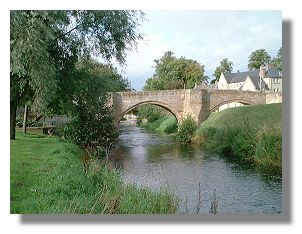 The rounded hills of the Scottish Borders are carved by numerous rivers and streams which meander through the area, contibuting to the character of the land - and its people. This poem by J B Selkirk, sings the praises of these meandering burns (a burn is the Scots word for a stream). It is noticeable that, like the running water, the poem is not broken up in any way into verses but flows continuously from start to finish. Indeed, the middle section is somewhat breathless as it runs on without any full stops!
The rounded hills of the Scottish Borders are carved by numerous rivers and streams which meander through the area, contibuting to the character of the land - and its people. This poem by J B Selkirk, sings the praises of these meandering burns (a burn is the Scots word for a stream). It is noticeable that, like the running water, the poem is not broken up in any way into verses but flows continuously from start to finish. Indeed, the middle section is somewhat breathless as it runs on without any full stops!
A Border Burn
Ah, Tam! gie me a Border burn
That canna rin without a turn,
And wi' its bonnie babble fills
The glens amang oor native hills.
How men that ance have kend aboot it
Can leeve their after lives withoot it,
I canna tell, for day and nicht
It comes unca'd-for to my sicht.
I see 't this moment, plain as day,
As it comes bickerin' owre the brae,
Atween the clumps o' purple heather,
Glistenin' in the summer weather,
Syne divin in below the grun,
Where, hidden frae the sicht and sun,
It gibbers like a deid man's ghost
That clamours for the licht it's lost,
Till oot again the loupin' limmer
Comes dancin doon through shine and shimmer
At headlang pace, till wi' a jaw
It jumps the rocky waterfa',
And cuts sic cantrips in the air,
The picture-pentin man's despair;
A rountree bus oot owre the tap o 't,
A glassy pule to kep the lap o 't,
While on the brink the blue harebell
Keeks owre to see its bonnie sel,
And sittin chirpin a its lane
A water-waggy on a stane.
Ay, penter lad, thraw to the wund
Your canvas, this is holy ground:
Wi' a its highest airt acheevin,
The picter's deed, and this is leevin.Meaning of unusual words:
kend=knew
bickerin owre the brae=moving quickly and noisily over the hill
Syne=since
loupin' limmer=leaping rascal
cantrips=frolic, witch's spell
rountree bus oot=rowan tree (mountain ash) pushing out
harebell=Scottish bluebell
Keeks=peeps
water-waggy=wagtail (a variety of bird)



